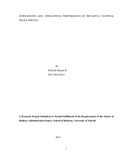| dc.description.abstract | Outsourcing is a viable operating strategy for any organization, including the police service, although it has non-profit objectives and therefore has limited experience in and use for outsourcing criteria developed for commercial enterprises. Outsourcing has become necessary in a bid to maximize limited resources due to the unavailability or inadequacy of funds for police operations. Feeling the intense pressure and burden of law and order maintenance, crime detection and other routine duties coupled with scarcity of resources, the police service have gradually adopted the outsourcing model as an operating strategy. Outsourcing should be used as a reform strategy to save cost and make the organization more efficient. The purpose of this study was thorough and comprehensive analysis of the situation in the field of outsourcing within the police service, with special emphasis on outsourcing non-critical functions and its impact on their operational performance. Presently, outsourcing by Kenya police is in the infancy stage while in the developed world, most of the police forces have already outsourced several of their non-critical functions. Therefore, the objectives of the study was to establish past measures the National Police Service (NPS) had taken to improve its operational performance and identify key areas that offer greatest potential for improvement in operational efficiency and infrastructural savings through outsourcing. This study further focused on in-depth review of the effects of outsourcing non-critical functions within the police service operations. Methodology focused particularly on descriptive and quantitative analysis of content, substantive, procedural and other relevant factors within the process of outsourcing and summarizes the results of empirical research on its impact on operational performance in police service. The study showed that the vast majority of surveyed officers (80 percent) had no actual evaluation framework, including objective criteria or a system of indicators to measure the eligibility of outsourcing decisions and that the officers’ decisions on outsourcing were mainly based on intuition and the inertia of previous years, rather than pre-established objective criteria and measurable indicators. The findings obtained lead to the development of concrete guidelines and recommendations for an outsourcing criteria and integrating with operational objectives of the police service | en_US |

